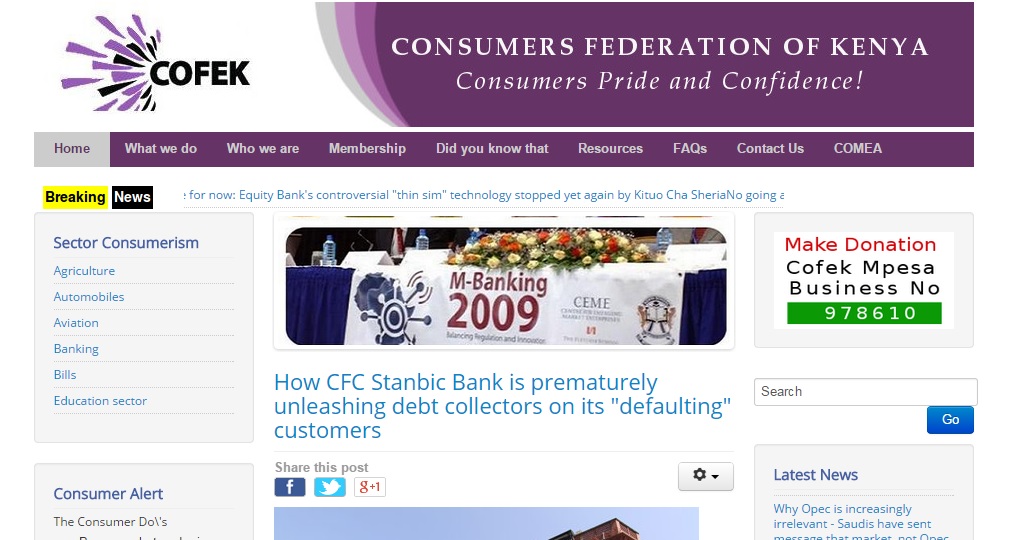
This blogger has come across the recent High Court ruling in the case of CFC Stanbic Bank Limited v Consumer Federation of Kenya (COFEK) & 3 others [2014] eKLR which was instituted when COFEK declined to take down an article published on its website, Facebook and Twitter accounts about one of CfC Stanbic’s branches outside Kenya. The bank approached the High Court alleging that it had been defamed by the article by COFEK and claimed for damages for libel, aggravated damages and for a permanent injunction to restrain COFEK from publishing the words contained in the said article.
The court, in finding in favour of the bank, stated as follows:
“I have considered that the article complained of is not only defamatory but its continued publication on the world wide web may continue to damage the Plaintiff’s [CfC Stanbic Bank’s] international business, the Plaintiff is a bank of repute operating not only in Kenya but throughout Africa; the continued circulation of the article in the worldwide web of the Defendant [COFEK] may hinder or affect the Plaintiff’s reputation and business operations; most of the averments by the Plaintiff in the Affidavit in Support and Further Affidavit were not denied. In addition, the act done can be summarily be remedied by removal of the offending publication. In my view, there exists special circumstances to warrant the granting of the interlocutory mandatory injunction.”
Media reactions to the ruling have applauded the High Court for reigning in the “overzealous” “reckless” actions of the consumer rights watch-dog. One commentator states:
“For a long time now, Consumer Federation of Kenya (Cofek) has struck fear among companies as it ceaselessly pursues what it terms consumer interests. (….) The ruling has certainly set a precedence that is likely to be followed by other companies in their bid to curtail the lobby’s apparent overzealous tendencies. Further, it will have implications on the work of other activists, especially their posts on social media.”
This blogpost aims to consider the High Court’s ruling in view of the competing constitutional, legal, commercial issues raised by both parties in this case. More importantly, this blogpost assesses the possible effects of this ruling on social media activism against large corporate entities.
On or about 1st October, 2014, COFEK caused to be published in its web-site http://www.cofek.co.ke an article entitled “How true is this allegation on Stanbic Bank Juba Branch on Foreign Exchange Transactions.” In the said article, there were allegations against the bank’s branch in the South Sudanese capital of lack of integrity in Foreign Exchange dealings; breach of Bank of South Sudan and Central Bank of Kenya regulations; arrogance by the bank’s Foreign Exchange dealer; breach of consumer rights and lack of integrity and responsibility by the bank’s management team. The bank’s contention before the court was therefore that the words complained of in COFEK’s article were defamatory; that COFEK’s website was open to general access by any user of World Wide Web, Facebook and Twitter and to thousands if not millions had free and open access thereto; that COFEK had declined to remove the offending article from its website and had published the same to the Central Bank of Kenya “CBK” and had intimated that it shall continue to publish the same and invite more comments thereon from the public.
In its defense, COFEK denied any wrong-doing and dismissed the bank’s claims. According to COFEK, it is a public interest organization, independent, self funded and non-political which is committed to consumer protection. COFEK claimed that it received the article from an anonymous source via its email address: hotline@cofek.co.ke therefore it was neither the author nor originator of the article but that it was the legitimate expectation of the anonymous author that COFEK would cause incisive investigations on the issues raised in the article. According to COFEK, the article posted on its website and social media platforms constituted fair public comment and was not defamatory of the bank and that the onus was on the bank to show that what was contained in the article was false or unfounded or that it was actuated by malice. In the absence of the bank discharging this onus of proof, COFEK was entitled to rely on the defences of fair public comment and justification under the law of defamation.
Furthermore, COFEK invoked several provisions of the Constitution to oppose the bank’s claims including Articles 10 and 232 and Article 46 in the Bill of Rights which enshrines the rights of consumers.
In making its ruling against COFEK, the court develops useful jurisprudence on the application of defamation law in the era of social media. Firstly, the court states that the requirement of “malice” in the tort of defamation is established where the person who is responsible for publishing an article, a tweet or a facebook post fails to inquire as to the facts or “verify the authenticity of the contents before republication”. Secondly, the court expands the definition of “publication” as a requirement for defamation. In this regard, the court finds that although COFEK received the article anonymously via email, the act of posting the contents of the offending article on its website and social media platforms amounts to publication. Furthermore, the court finds that by republishing the offending article, COFEK is taken to have assumed responsibility in respect of the article.
Finally, with regard to COFEK’s constitutional argument, the court found that when exercising the freedom of expression under Article 33 of the Constitution, there is a duty of care on the dignity and reputation of others. In the same breath, the court found that since the right to reputation is now a constitutional right, when invoking the consumer rights enshrined under Article 46 of the Constitution, the reputation and dignity of others must be respected.